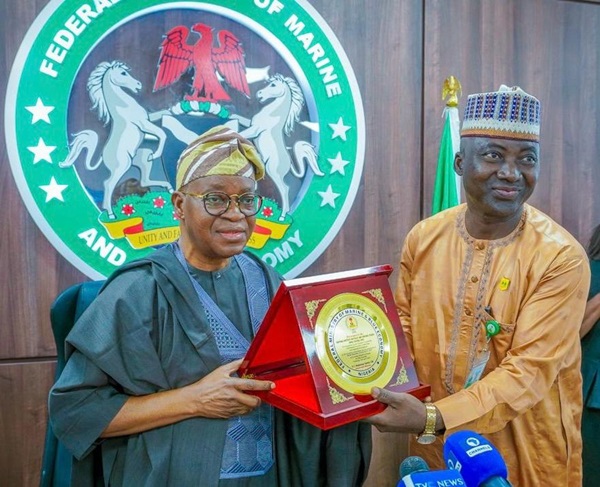
The Minister of Marine and Blue Economy, Adegboyega Oyetola, has revealed the fierce behind-the-scenes struggles that led to the eventual resolution of the long-standing Apapa gridlock – a crisis that had crippled port operations and economic activities for more than two decades.
Speaking on Wednesday while addressing members of Study Group 4, Senior Executive Course 47 of the National Institute of Policy and Strategic Studies (NIPSS), who were on a study tour of the ministry, Oyetola recounted the arduous path to restoring sanity to Nigeria’s busiest maritime corridor. He described the victory as one born not only of policy and planning, but of sheer political will and determination to dismantle a system of entrenched interests.
“The Apapa gridlock wasn’t natural – it was engineered. Some individuals and syndicates had built careers and empires on the dysfunction of that corridor. Breaking that cycle meant taking on powerful interests who didn’t want change,” the minister said.
According to Oyetola, when he assumed office in 2023, he immediately recognised that Nigeria’s blue economy ambitions could not thrive without addressing the Apapa bottleneck. But the challenge, he said, extended beyond poor infrastructure or weak administration – it was a deeply entrenched network of collusion and corruption.
“Clearing that gridlock meant confronting years of collusion, corruption, and intentionally cultivated disorder. We identified the patterns, unmasked the players, and took decisive action. It wasn’t easy. It was gritty and risky, but it had to be done,” he emphasised.
Oyetola said a major turning point came in December 2023 when he formally wrote to the Minister of Works, Senator Dave Umahi, requesting urgent attention to the failed portions of the Apapa port access roads. Recognising that no meaningful change could occur without functional infrastructure, the Minister explained that Umahi responded swiftly and responsibly.
“I reached out to my colleague, Umahi and appealed for his support. His response was immediate and commendable. Road repairs began almost immediately and that gave our broader reforms the breathing space they needed to succeed,” he said.
He also credited the Lagos State Government for playing a crucial role by supporting the Federal Government’s efforts to demolish illegal structures and shanties that had become breeding grounds for chaos and criminality along the port access roads.
With the roads repaired, access restored, and a digital truck scheduling system introduced, the once-notorious Apapa gridlock began to dissipate, eventually disappearing entirely. According to the minister, this milestone was the result of coordinated, cross-sectoral collaboration and a clear-eyed vision for reform.
“For the first time in over two decades, trucks no longer spend weeks queued up to pick up or deliver cargo. Port users now enjoy seamless operations. Haulage costs have dropped by up to 60 per cent. What used to be a nightmare is now a functioning system,” Oyetola said.
He noted that the improvements go far beyond logistics. Residents of Apapa now live in cleaner and quieter surroundings, small businesses that had previously shut down due to inaccessibility are beginning to return and port workers are operating with renewed efficiency.
“Where chaos once reigned, there is now order. Where traders once lost billions, we are now attracting major global container carriers. The ports are active again. Trade is flowing. Time is being saved. Revenue is growing. Most importantly, lives are being improved,” he stated.
Oyetola recalled the many years when the gridlock led to business closures, crashed property values, and untold hardship for thousands. “Too many lives were lost. Families suffered. Businesses shut down. It was an economic tragedy. I’m proud that we’ve turned that page and written a new chapter of progress,” he said.
Despite the success, the minister cautioned that maintaining the gains would require ongoing vigilance and firm enforcement.
He described the elimination of the Apapa gridlock as a defining achievement of his tenure – proof of what is possible through focused leadership, inter-ministerial cooperation and the courage to confront long-standing inefficiencies and vested interests.
The NIPSS Study Group was led by Brig-Gen Abdulrahman Idris, a director of the institute, who commended the minister for what he described as bold and transformative leadership in the maritime sector.

